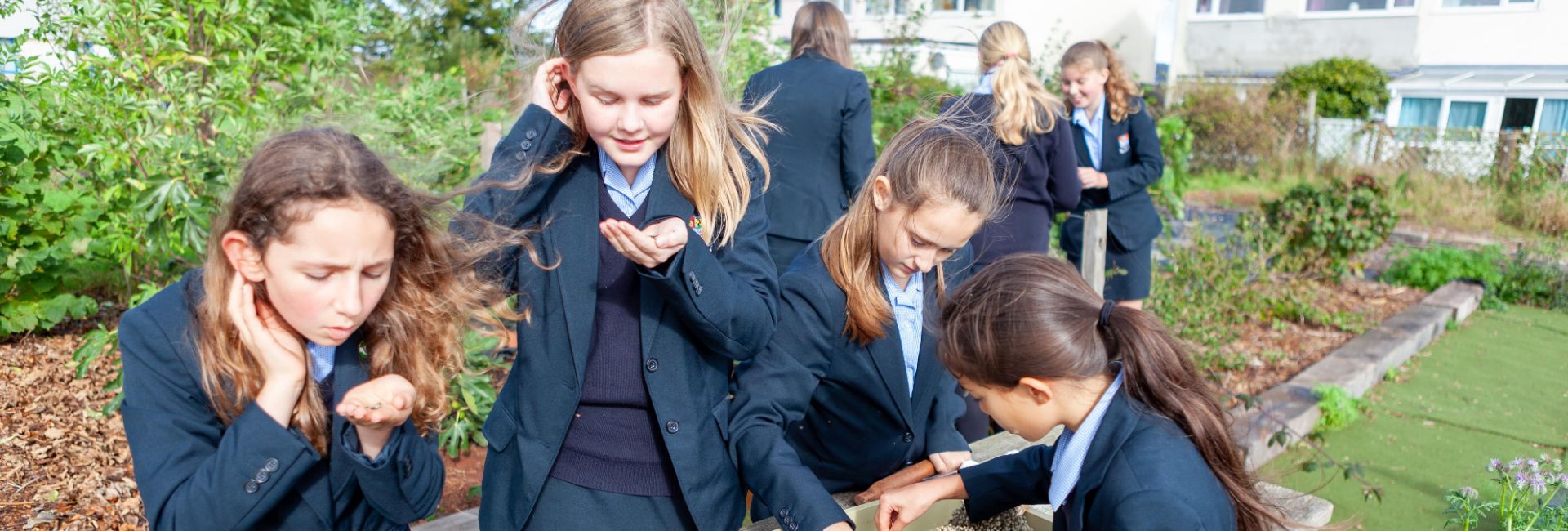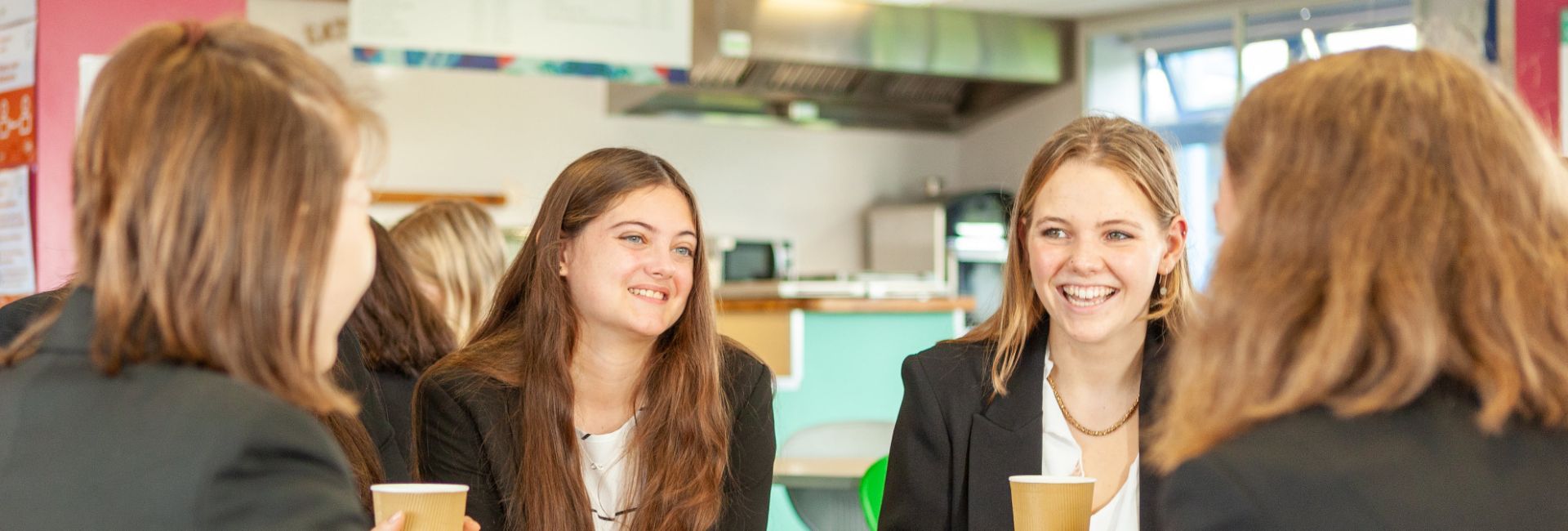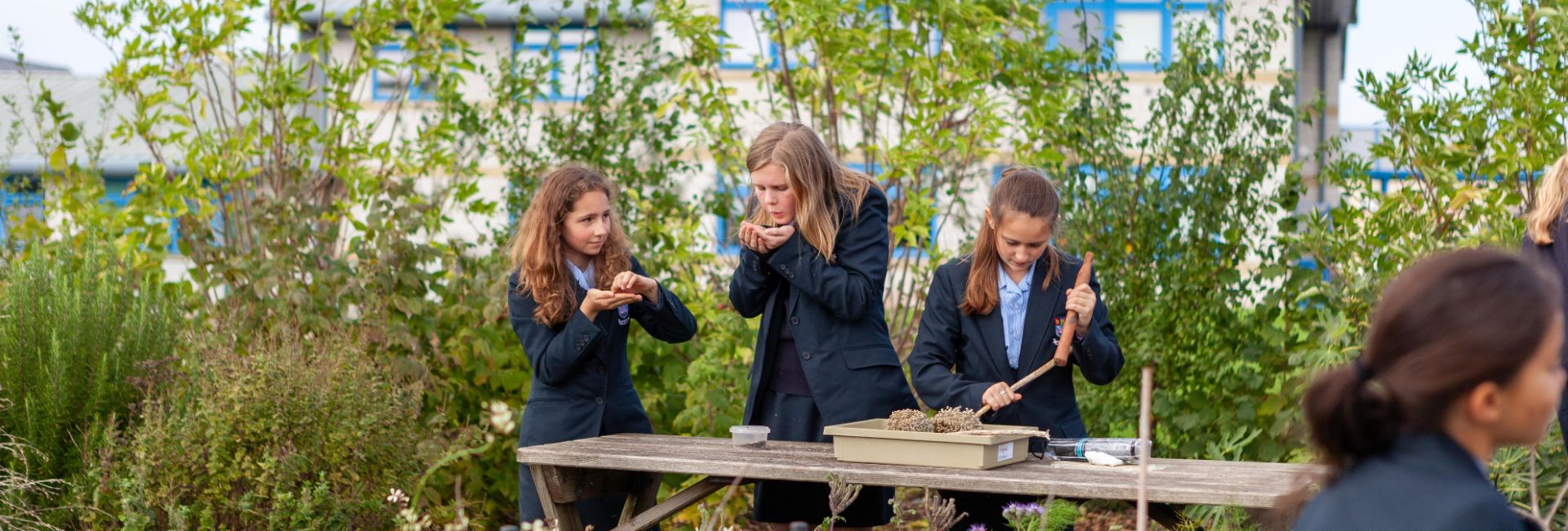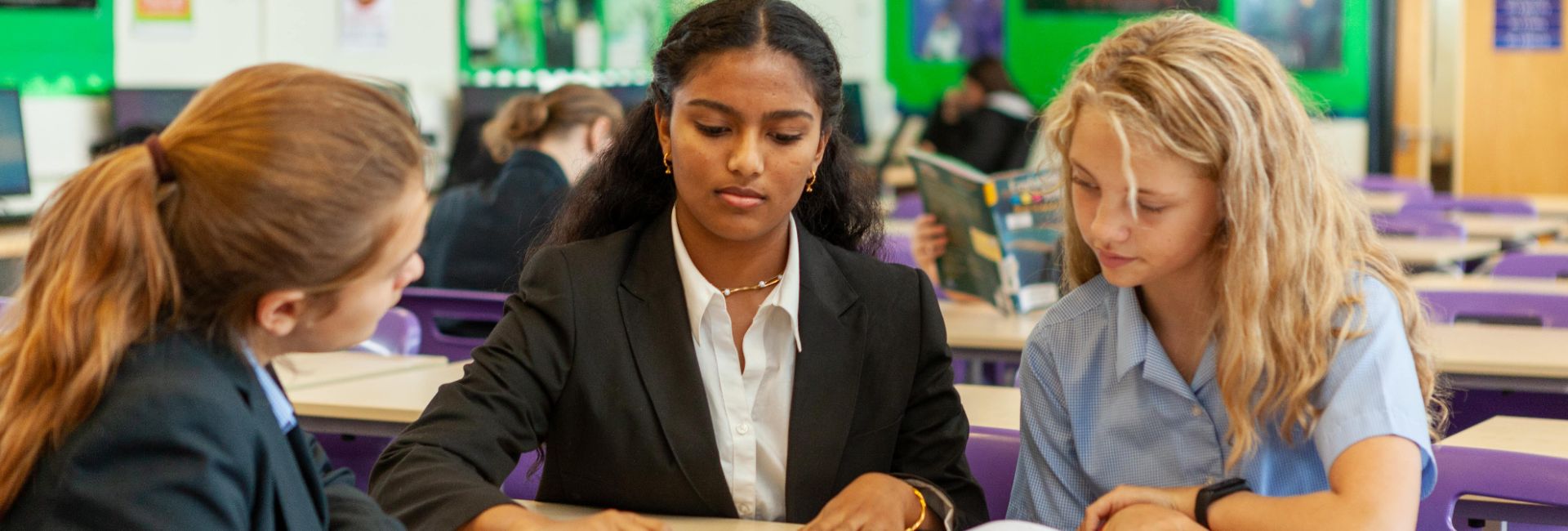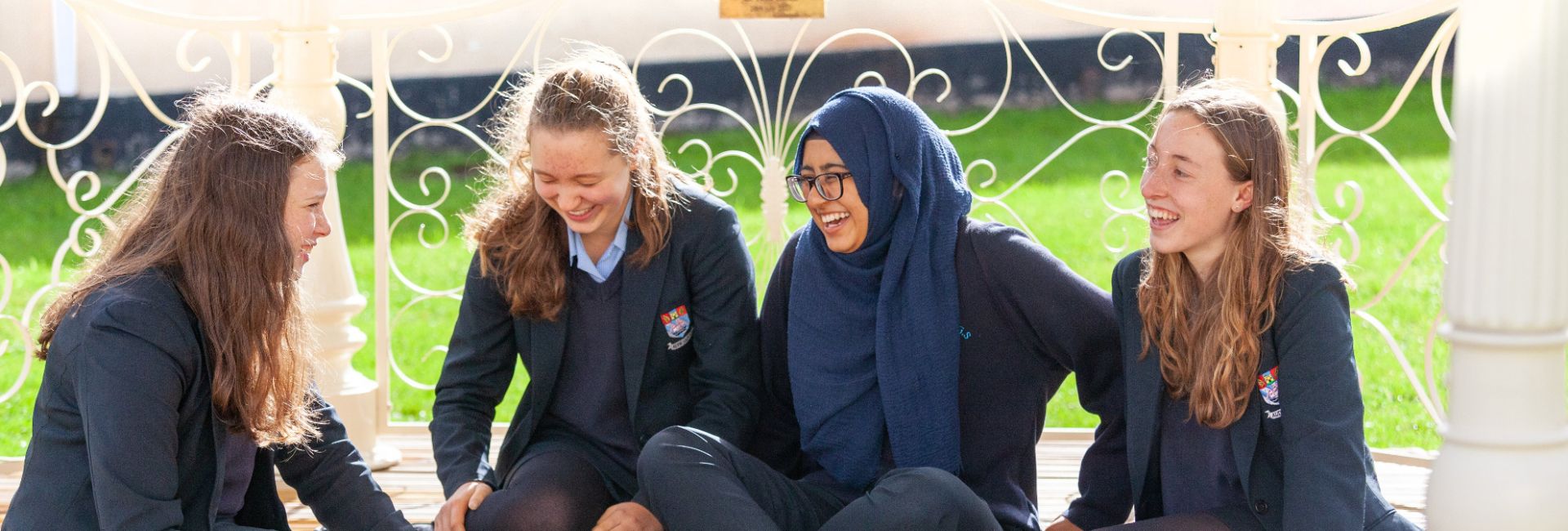KS3 Overview
Students participate in a wide variety of activities which offers them the opportunity to develop physical competence, confidence and their ability to perform in a range of physical activities. Through this they learn how to co-operate and collaborate with others, as part of a team, understanding fairness, resilience, and equity of play to embed long lasting values. The lessons enable them to improve physical, mental and social health and have an understanding of each aspect of health.
In Key Stage 3 students:
- use a range of tactics and strategies to overcome opponents in direct competition through team and individual games , for example: netball, hockey, rounders and tennis
- develop their technique and improve their performance in other competitive sports: for example, athletics and gymnastics.
- perform dances using advanced dance techniques within a range of dance styles and forms
- analyse their performances compared to previous ones and demonstrate improvement to achieve their personal best
In Years 7 and 8 students will have programmes of study in netball, hockey, gymnastics, dance, rugby, football, volleyball, badminton, tennis, rounders, cricket and athletics. They will also learn about what happens to the body when you exercise and the benefits of leading a physically active life.
In Year 9, the health and fitness programmes also includes how to test the 11 components of fitness and how to create a fitness programme to improve their own fitness levels. Trampoline, table tennis, basketball and yoga is also taught in addition to the activities from years 7 and 8.
Building on KS2 and preparing for KS4…
Students build on and embed the physical development and skills learned in key stages 1 and 2, become more competent, confident and expert in their techniques, and apply them across different sports and physical activities. They develop their knowledge about what makes a performance effective and how to apply these principles to their own and others’ work. They develop the confidence and interest to get involved in exercise, sports and activities out of school and in later life, and understand and apply the long-term health benefits of physical activity.
In key stage 4 students further develop the range of tactics and strategies to overcome opponents in team and individual games, learned in Key Stage 3. Students are given opportunities to involved in a wider range of activities that develops personal fitness and promotes an active, healthy lifestyle. This includes use of the fitness suite, yoga and Pilates sessions.
KS3 Assessment
At TGGS, we assess KS3 pupils holistically in PE to ensure we are developing the whole child — not just as a performer, but as a thinker, teammate, and leader. Assessment is structured around four core pillars: physical competency, tactical understanding, personal and social development, and health-related knowledge. This approach aligns with the national curriculum’s aims to foster physical confidence, sustained participation, and a positive relationship with physical activity.
KS3 Content
|
Y7 & 8 Content Autumn - Spring |
Students in Year 7 rotate every 3 weeks which gives them 6 lessons per activity. So each group will have taken part in the following sports: Dance - Students will continue to explore a range of dance movements using steps, gestures, formations, body shapes, contact work, and contrasts in dynamic and rhythmic patterning. Hockey - students will further develop their skills through small-sided games, developing tactical awareness, positions and positional play. They will also develop their understanding of the rules and set play. Netball – Students will focus on replication of the fundamental skills required to perform at maximum levels in small sided games. These will include throwing, catching, footwork. Development of the basic principles of attack and defence in netball and be challenged in pressured and competitive situations. Gymnastics – Students will refine their body management skills through individual and partner sequences, focusing on control, balance, and fluidity. They will develop their use of apparatus and explore variations in level, speed, and direction while applying compositional principles. Volleyball – Students will be introduced to and develop key skills such as serving, volleying, and setting. They will learn court positions and begin to apply tactical elements in small-sided games, with a focus on communication, teamwork, and decision-making. Football – Students will further develop technical skills including passing, dribbling, shooting, and defending. They will build tactical awareness through conditioned games, focusing on positioning, support play, and transitions between attack and defence. Rugby – Students will develop core rugby skills such as passing, tackling, rucking, and evasive running. They will understand basic gameplay principles including width, depth, and support play while beginning to apply strategies in small-sided, non-contact or contact games (depending on experience and confidence). |
|
Y7 & 8 Content Summer |
Athletics - Students will be introduced to basic athletic skills and develop an accurate replication. Students will develop the skills of sprinting, sustained running, jumping and throwing. Rounders - Students will replicate and improve core skills in batting, bowling and fielding. Students will work on improving the quality of replication with the intention of outwitting opponents. In striking and fielding games, players achieve this by striking the ball so that fielders are deceived/avoided and running between bases to score runs. Students should develop physical literacy/body movement competence and begin to accurately score games. Tennis – Students will be able to demonstrate & use the correct grip and understand the ready position. Students will be able to accurately replicate a basic stroke and maintain a simple rally. They will understand the basic scoring and rules of a double game play. Students will develop their understanding of tactics and play shots within a rally more consistently. Cricket - Students will develop key batting, bowling, and fielding techniques through skill-based practices and small-sided games. They will learn how to apply these skills within tactical scenarios, including striking placement, field positioning, and decision-making. Understanding of the rules and scoring systems will also be embedded through modified match play. |
|
Y9 Content Autumn - Spring |
Students in Year 9 will be able to opt into pathways in year 9 and take more autonomy over the sports they decide to participate in over the course of the year. They will opt into two sports per half term from the following: Dance - students will explore a range of dance movements using steps, gestures, formations, body shapes, contact work, and contrasts in dynamic and rhythmic patterning. Students will demonstrate creativity by copying and adapting movement and movement phases from Matthew Bourne's The Nutcracker. Students will evaluate and assess movements to improve routines and perform dances using advanced dance techniques within a range of dance styles and forms. Hockey - students will be refining core skills as a team and as individuals to outwit opponents. Teams will be expected to plan strategies and implement them in competitive games. They will be working on how to beat defensive players as well as learning set plays for the attack and defence. Health Related Fitness - Students will reinforce their understanding about the importance of warming up and create their own warm up. They will learn about the different components of fitness and which are health related and which are skill related. Students will learn how to test their own fitness and analyse normative data. Students will further develop their understanding of the importance of leading an active lifestyle. Netball - students will recap all the fundamentals from Years 7 and 8 and further develop their game play including court linkage, effective centre passes and backline throw set plays. Students will learn about the 3 stages of defence and use it in skills practices and game play. Students will be encouraged to learn all the positions and rules of the game. Trampoline - Students will learn how to accurately replicate basic shapes, turns, drops and rotational movements. Students will be able to demonstrate correct take-off and landing technique, as well as a clear body shape whilst airborne or in contact with the bed. They will learn how to apply movements individually and as part of a fluent sequence. Students will select, combine and perform skills demonstrating varied levels of creativity. Football - Students will learn passing, receiving, dribbling, turning and shooting the ball. They will learn how to control the ball both under pressure in small sided games and in skills practices. Students will learn to use basic principles of play when selecting and applying tactics for defending and attacking. Students will develop the skills necessary to outwit opponents. Rugby – Students will consolidate core skills such as passing under pressure, tackling safely, and rucking with control. They will develop tactical understanding through structured gameplay, including phase play, supporting lines, and defensive organisation. Emphasis will be placed on teamwork, communication, and applying strategies to outwit opponents in both attack and defence. Gymnastics – Students will refine and extend their compositional sequences, incorporating advanced elements such as flight, counterbalance, and partner/group work. They will focus on precision, creativity, and fluency, with an increased emphasis on evaluating performance and applying feedback to improve execution and complexity. Volleyball – Students will build on their foundation of volleyball skills with a focus on developing more advanced techniques such as setting for attack, spiking, and tactical serving. Gameplay will emphasise court coverage, coordinated team movement, and applying systems of play such as rotations and formations. Table Tennis – Students will improve technical consistency in forehand and backhand strokes, develop spin variation, and apply serve and return strategies. They will enhance their tactical awareness through singles and doubles match play, focusing on shot selection, anticipation, and competitive gameplay etiquette. Basketball – Students will develop more advanced techniques such as lay-ups, jump shots, and defensive footwork. They will refine their tactical understanding of offensive structures (e.g., screens, spacing, fast breaks) and defensive strategies (e.g., man-to-man and zone defence). Emphasis will be placed on decision-making under pressure, teamwork, and adapting play to different scenarios. Yoga – Students will deepen their understanding of yoga practice, focusing on flexibility, balance, and core strength through a range of poses and flows. They will explore the connection between breath and movement, and develop mindfulness techniques to support wellbeing, stress management, and focus. Sessions will encourage self-awareness and self-evaluation of physical and mental progress. |
|
Y9 Content Summer |
Students will complete all four of the following sports and events in the summer term: Athletics – Students will further enhance replication and performance across all disciplines. Students will gain a more detailed understanding of fitness and its effect on performance. Students will focus on planning, preparing for and competing in a range of athletic competitions. Students will perform core skills and record personal/collective bests. Students will develop knowledge of the immediate effects of exercise and physically exert themselves throughout. Rounders - Students will demonstrate consistency, timing and fluency in the execution of core skills for batting, bowling and fielding. Students will work on improving the skill of outwitting opponents as a batter and bowler. Development of decision making skills will be encouraged through game play. Students should independently be able to score and officiate rounders games.Tennis - Students will focus on consistently replicating core skills through competitive situations attempting more advanced variations. Students will develop the ability to land the ball in a target area and refining game tactics with the intention improving personal best. Students will be expected to understand the games rules, accurately score/officiate. Cricket - Students will learn to use basic principles of play to work towards successful outcomes. Students will develop the skills necessary to compete in competitive games. Batting, bowling and fielding will be developed through games and conditional situations. Technique will be further tested through its use in small sided games and assessed against expected learning outcomes. |


